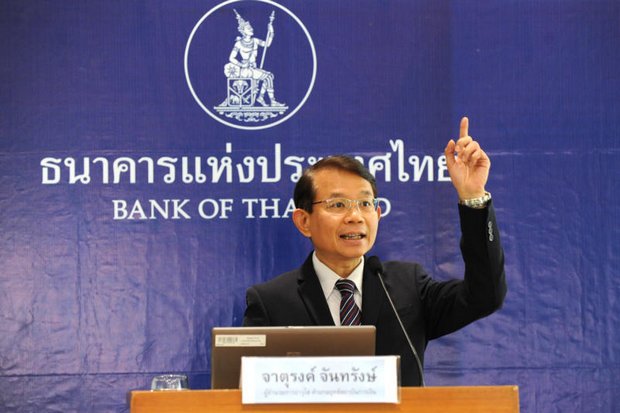
The Bank of Thailand stood pat on its policy rate as widely expected Wednesday, but an additional committee member unexpectedly voted for a 25-basis point hike, reinforcing signs that the rate will increase at coming meetings for the first time since 2011.
Five members of the Monetary Policy Committee (MPC) voted to keep the rate steady at 1.50%, where it has been since April 2015, while two voted for a quarter-point hike, up from one vote in the past several meetings.
The committee views the accommodative monetary policy stance as conducive to the continuation of economic growth and appropriate given the inflation target; therefore, most members decided to keep the policy rate unchanged at the meeting.
"Nevertheless, two members viewed that the continued economic expansion was sufficiently robust and that prolonged monetary accommodation induced households and businesses to underestimate potential changes in financial conditions," the MPC said in a release. "The rate increase is to curb financial stability risks that could affect the sustainability of economic growth over the longer term and start building policy space."
The need to ease monetary policy has continued to decline, but the MPC needs to further monitor all factors, including economic momentum, inflation rate, financial conditions and financial stability, said Jaturong Jantarangs, the MPC secretary.
The central bank will take updated economic projections into consideration for the next policy rate call, he said, but it has not yet factored in next year's general election.
According to the updated forecast made at the meeting, the central bank is maintaining its forecasts for the country's economic growth of 4.4% this year and 4.2% in 2019, but it raised its private consumption view to 4.2% growth this year from 3.7% seen earlier, and to 3.7% in 2019 from 3.6% before.
The central bank significantly trimmed its outlook for government investment growth to 6.1% for 2018 from the 8.9% previously estimated, given that constrained budget disbursement will lower public expenditure to a slower pace than earlier forecast.
Although the central bank is still maintaining an export growth forecast of 9% this year, uncertainties over the US's trade policies compelled the bank to slash its 2019 growth estimate for merchandise shipments to 4.3% from 5% previously seen.
But the impact from the US-China retaliatory trade measures should be partly offset by benefits from the potential relocation of production bases in both countries to Thailand.
"Without the heightening trade dispute, Thai export growth could be above 5% next year," Mr Jaturong said.
He said the overall economy continues to gain traction, driven by both domestic and external demand. But it will be subject to downside risks and uncertainties regarding US foreign trade policies and geopolitics. The country's general election is another source of uncertainty.
Trade protection measures have also taken a toll on foreign currencies around the world, particularly in emerging economies. But baht volatility is lower relative to other emerging currencies.
Even so, Thailand's nominal effective exchange rate is up 4% from the beginning of the year.
The baht's relative strength against the US dollar compared with other regional currencies is due to foreign capital movement rather than fundamentals, so the central bank needs to closely monitor those, Mr Jaturong said.
He said the MPC believes that condominium oversupply in certain areas warrants monitoring.
Meanwhile, Standard Chartered Bank Thai economist Tim Leelahaphan said in a note that the central bank will start tightening monetary policy with a 25-basis-point hike at the next meeting, scheduled for Nov 14, and raise again at this year's final meeting on Dec 19, given the growing vote split.
"With the macroeconomic environment improving, we think it would be reasonable to normalise the policy rate to at least 2%, creating a 50-basis-point space to manoeuvre in the event of an unforeseen economic shock in the future," he said.
- Earlier report: Central bank holds rates